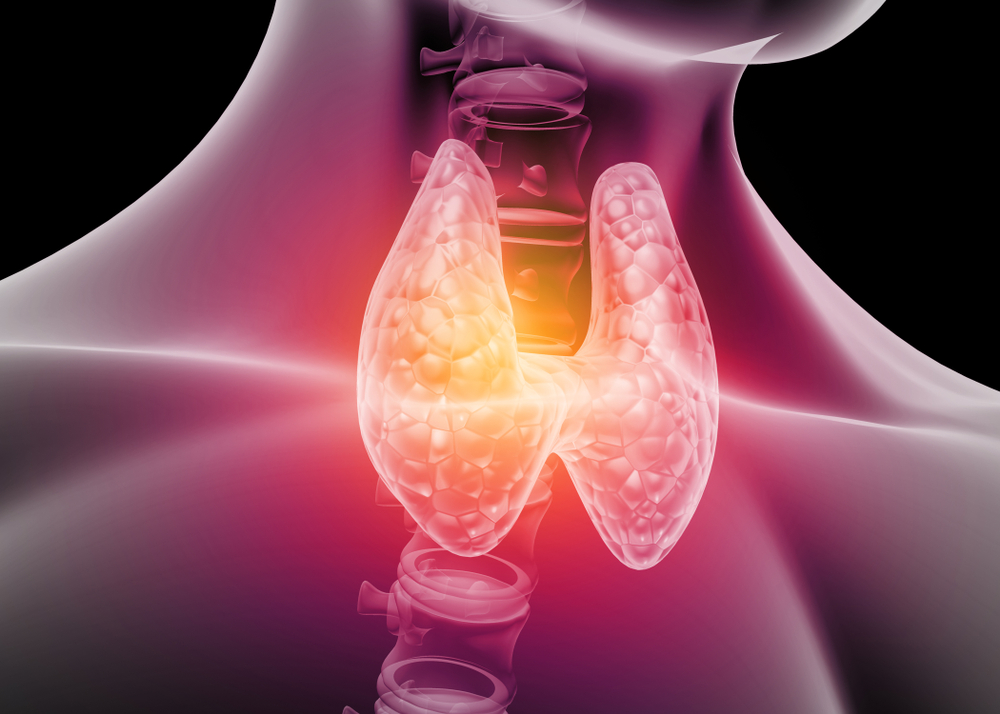
Overview
Thyroiditis is a clinical condition that denotes an inflammation or swelling of the thyroid gland. The thyroid gland is an endocrine gland located in front of the neck which secrets thyroid hormones. These hormones control metabolism by enhancing the rate (fast or slow) at which organs like the heart and brain function.
Thyroid gland swelling may incur hormonal imbalance, which may hinder hormonal functions. This swelling may occur during an attack by antibodies, infections such as viral and bacterial infections, and even the use of pharmaceuticals like amiodarone which may have potential damage to the thyroid gland.
Phases of Occurrence
The inflammation occurs in three phases.
- The swollen gland will secret high levels of thyroid hormones, i.e. hyperthyroidism. This is the Thyrotoxic phase.
- Hypothyroidism follows after some months. It indicates low levels of thyroid hormone.
- The euthyroid phase signifies that hormonal balance is restored, and the cycle repeats after some months (especially if not treated).
Types of Thyroiditis
Thyroiditis is typically classified into different types, namely:
- Silent or painless thyroiditis
- Postpartum thyroiditis
- Hashimoto’s thyroiditis
- Suppurative or acute thyroiditis
- Granulomatous or subacute or de Quervain’s thyroiditis
- Riedel’s thyroiditis
The onset of thyroiditis is mainly between the age of 30 and 60. However, Suppurative thyroiditis is liable to surface between 20 and 40 years of age as it is associated with juveniles.
Key Facts
- The suffix “itis” medically means inflammation. This implies that “thyroiditis” is the inflammation of the thyroid gland.
- Thyroiditis occurs in three phases (thyrotoxic, hypothyroid and euthyroid) and manifests in various types (listed above).
- Its symptoms may also point to other diseases; hence, precision in diagnosis is pivotal.
- The primary cause is the autoimmune-a drawback in the immune system.
- No actual prevention but lifestyle matters.
- Only a doctor can approve a suitable therapy for its treatment.
Symptoms
The occurrence of most types of thyroiditis typically begins with the experience of hyperthyroidism (unregulated and excessive excretion of thyroid hormones) followed by hypothyroidism (low excretion of thyroid hormones). Given the circumstances, symptoms of hyperthyroidism and hypothyroidism are, consequently, thyroiditis symptoms.
Meanwhile, note that these symptoms are not exclusive to thyroiditis alone but also other diseases. This is where diagnosis makes the distinction.
Symptoms of Hyperthyroidism
Depending on the type of thyroiditis, these symptoms manifest when thyroid hormone secretion into the bloodstream is high and unregulated. These symptoms are:
- Irritableness
- Sleeping disorder
- Weight Loss
- Rapid heart rate
- Muscle aches
Symptoms of Hypothyroidism
These symptoms appear in chronic conditions. They are:
- Adding weight
- Depression
- Fuzziness
- Constipation
- Leg edema
- Puffy eyes
- Slow heart rate
- Low body temperature
- Lethargic feeling
- Weakness of the muscles
However, general, indicative symptoms of thyroiditis include:
- Sore throat
- Fever
- Painful swelling around the throat termed goiter
The aforelisted symptoms will vary in manifestation given the state of the inflammation, which signifies when the gland is overactive (hyperthyroidism) or underactive (hypothyroidism).
Diagnosis
When an individual observes swelling in front of the neck (goitre) or examines any sign of hyperthyroidism and hypothyroidism, seeing a doctor should be the next plan.
Based on the doctor’s examination, an appropriate diagnosis will be approved. Also, not all indicative symptoms are exclusive to thyroiditis. These symptoms may also point to other diseases. Hence, a quite precise diagnostic procedure should be considered.
Various diagnostic tests and procedures for thyroiditis include the following:
- Thyroid Function Test
The doctor will approve a blood test to enable them to study the level of stimulating thyroid hormone and the other thyroid hormones in the bloodstream.
A heightened TSH level indicates a low T4 level since the pituitary glands secrete TSH to stimulate the secretion of thyroid hormones (T4 and T3).
- Ultrascan
The sonogram will reveal the case of:
- Growth in the gland.
- The thickness of the gland and;
- Alteration in blood flow.
- Antibody Test
The blood test outcome will be used to monitor the level of antibodies in the bloodstream. This could point to an autoimmune condition as the cause.
- The Rate of Erythrocyte Sedimentation
This procedure can detect subacute or de Quervain’s thyroiditis. The rate at which the red blood cell declines will determine the inflammation. Acute thyroiditis can be seen through this means.
- Iodine Uptake
With the aid of a device, the doctor will monitor the degree of radioactivity in the gland as you orally swallow Iodine (in liquid form or capsule). This will verify the extent of iodine absorption by the thyroid gland.
Causes
A widespread of factors and conditions may cause your thyroid gland to swell, including the following:
- The autoimmune factor (in Hashimoto’s thyroiditis). This is the most common cause, as antibodies may regard the thyroid gland as a foreign substance and begin to attack it.
- Viral and bacterial infections, as in the case of subacute thyroiditis.
It usually spans a cycle beginning with pain, then hyperthyroidism, hypothyroidism, followed by a balance in thyroid gland function
- Intake of medications like interferon and amiodarone.
- Postpartum thyroiditis may barely set in after childbirth as pregnancy influences hormone regulations in the thyroid gland. Women with this case most likely had a history of thyroid issues.
- Fibrosis of the thyroid gland (a situation where thyroid tissues are supplanted by fibrous tissues) is seen in Riedel’s thyroiditis.
Prevention
Sadly, there are no conclusive preventive measures for thyroiditis. Regardless, certain life decisions we impel will count in handling the condition. These decisions include the following.
- Avoid smoking
- Consider Perchlorates intake.
- Regular iodine nutrition. This will improve iodine deficiency.
- Diets that contain magnesium, fluoride, potassium, protein, calcium, and vitamins (vitamins A, B, and C) will improve thyroid functions.
- Prevent the intake of alkaloids (caffeine, morphine, quinine). They alter heart rate and blood pressure.
Typical Treatments
- Thyroid Hormones (T4, T3) Replacement Treatment
Thyroxine, T4, can be replaced by its alternative, levothyroxine which is a synthetic hormone. This remedy is used to treat hypothyroidism hence, balancing thyroxine levels.
Also, Cytomel can be administered in place of triiodothyronine. Nevertheless, just as T4 biochemically converts to T3, its alternative can also be converted to T3 without the administration of Cytomel.
For Hashimoto’s thyroiditis, this therapy is a life treatment because hypothyroidism here is lasting. Postpartum, silent, and acute thyroiditis and hypothyroidism can be treated between six to twelve months.
- Symptoms Treatment
Beta-blockers can be approved by the physician to enhance symptoms like rapid heart rate and tremors.
NSAIDs (nonsteroidal anti-inflammatory drugs) and steroid treatment can be prescribed to manage the pains involved with acute and subacute thyroiditis.
- Surgical Treatment
For Riedel’s thyroiditis, surgery is pivotal. This treatment implies the complete removal of the thyroid gland. The potential risk involved here is the damage to the parathyroid gland and the associated nerves supplying the vocal cord.
- Radioactive iodine Procedure
Regular intake of radioactive iodine will cause thyroid gland cells to discontinue hormone secretion. However, it’s a therapy that requires thoughtfulness due to its aftermath.
- Antithyroid Therapy
For this treatment, the doctor may recommend you continue with antithyroid medication for about twelve months. This treatment improves hyperthyroidism.
- Medicinal Regimen
Different combinations of certain drugs can be prescribed to treat different types of thyroiditis. These drugs include:
- Corticosteroids
- Metoprolol
- Prednisone
- Tamoxifen
- Atenolol
Conclusion
As the case may be, thyroiditis could be a severe condition. However, not life-threatening at this stage. Therefore, when indicative symptoms are observed, you should see a doctor immediately. The doctor, via specific diagnostic procedures, will recommend a suitable treatment plan.
Upon delay, a long-term case of thyroiditis may eventually become life-threatening as it may lead to a thyroid storm.
MOST COMMON






